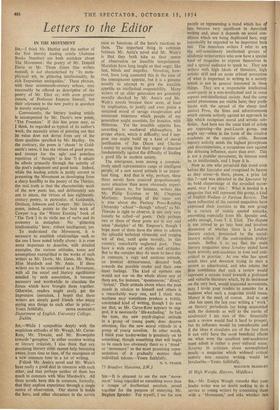SIR,—It is pleasant to see the new move- ment' being
regarded as something more than a troupe of intellectual acrobats joined together for the purpose of annoying Mr. Stephen Spender. For myself, I see the new people as representing a trend which has of late become very significant in America!! writing and, since it depends on social con• ditions which are being duplicated here, may reasonably be expected to be important here too. The American writers I refer to are the self-consciously intellectual groups of academic writer-critics who now have a special kind of magazine to express themselves in and a special audience to speak to. They are writers with high ideals of literature, high artistic skill and an acute critical perception of what is important in writing in a society which is not in general interested in these things. They are a respectable intellectual avant-garde in a non-intellectual and in some aspects anti-intellectual society. And the same social phenomena are visible here; they prolis ferate with the spread of the cheap (and junior) Press, the films and advertisements which operate actively against an approach tc) life which recognises moral and artistic sube tidies. And here too the same kind of artist$ are appearing—the post-Leavis group, one might say—often in the form of the creative academic or the creative critic. Because literary activity needs the highest perceptions; and discriminations, a scrupulous care against the debasing influence, more than ever. Thia is not a popular movement; its interest must be to intellectuals, and I hope it is.
Now as one who perceived this trend even
before Spectator and recognised its figure$ as they arose—is there, please, a prize for this 7—and was attracted to the Spectator by its bold chaperonage of the so-called move- ment, may I say this ? What is needed is st magazine that will represent this group, a kind of English Hudson or Partisan Review. The most influential of the current magazines havo expressed their aversion to the new group in a variety of widely quoted remarks, emanating especially from Mr. Spender and, oddly enough, from T. S. Eliot. The dispute is too inbred to go into here and involves discussion of whether there is a London literary racket, dominated by the social- literary milieu of the metropolitan profes- sionals. Suffice it to say that the main literary magazines since Scrutiny ended have been severely anti-academic in tone and anti- critical in practice. As one who has spent much time and devotion trying to start a review as adumbrated, and .who retains the firm confidence that such a review would represent a serious trend towards a profound and valuable literature which, by its insistence on the very best, would transcend movements, may I invite your readers to consider for a moment what such a magazine could mean, Money is the need, of course. And as one .vho has spent the last year writing a ' work on literary periodicals (so being acquainted with the demerits as well as the merits of academics) I am sure of this: financially such a review would find it hard to prosper, but its influence would be 'considerable and. if the ideas it circulates are of the best then it can only have the most beneficial effects on what even the excellent anti-academics must admit is rather a poor cultural scene. Scrutiny in criticism alone accomplished .much; a magazine which widened critical activity into creative writing would be invaluable.—Yours faithfully,
MALCOLM BRADBURY
50 High Worple, Harrow, Middlesex


































 Previous page
Previous page